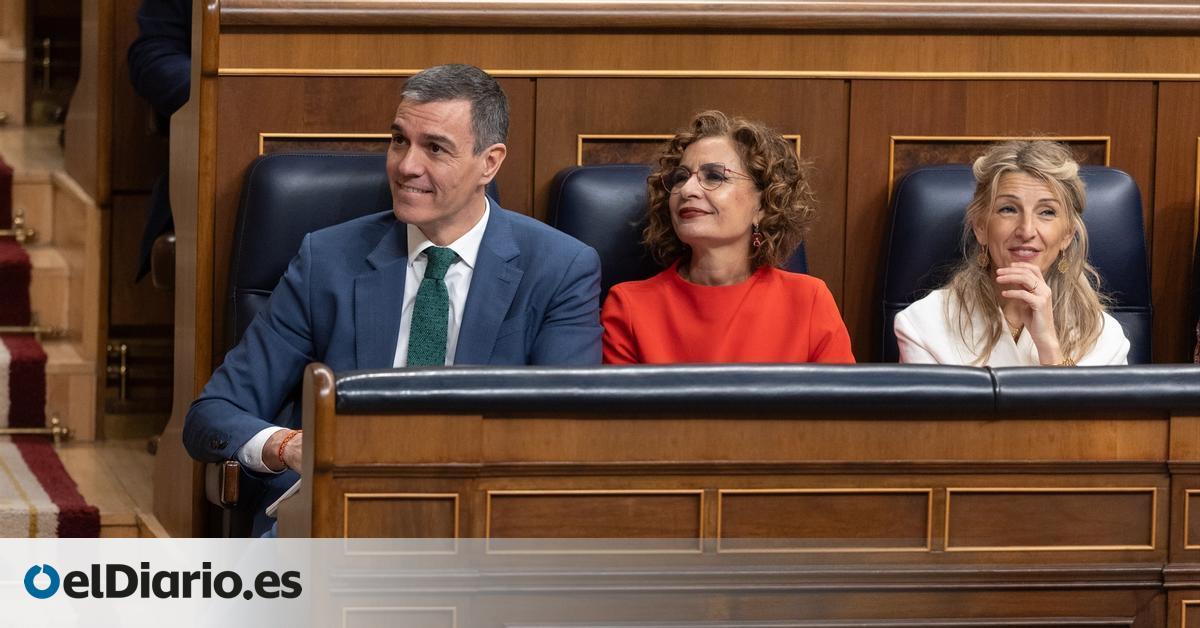
Finance and work do not finish finding an agreed output to the frontal shock for the taxes paid by workers who charge the minimum wage. After weeks of internal tensions, the department of María Jesús Montero self -inmed its position. To close in band that the minimum interprofessional salary (SMI) was one more year the border between the income that IRPF must pay and those that are not, to sit with the Yolanda Díaz team in search of a formula that allows that group of employees to deduce taxation. At the last minute of this Thursday, both parties confirmed that a technical solution had not been completed and that the conversations continued in extremis to prevent the confrontation from climbing a little more on the parliamentary route.
This Friday is the legal limit that the Government has to register in Congress the veto to the proposals of adding, pp and we can seek to knock the decision taken in their day by the Treasury that this year, after the new revaluation, the receptors of the minimum wage will be taxed. Being a measure that has an impact on public accounts, the Constitution grants to the Executive the power to block those proposals, although the idea was to reach an agreement within the coalition before the deadline expires and thus save a complicated breakup photo for digest and add.
“We hope to reach the agreement in the next few days. We have moved, but we cannot raise to the infinity and permanently the saving of low income because it would make the collection fall entirely, since we are bringing the minimum wage closer to the most frequent wages,” said Maria Jesús Montero on Thursday to questions from the press. The First Vice President and Minister of Finance explained that the approach with which it works goes through “compensating” 20% of workers who charge the minimum, which would imply “just over 200 million” of impact on public coffers, according to the calculations of Montero itself.
“We started negotiating since Tuesday and we kept negotiating,” Diaz explained on Thursday morning in an interview in RNE. The second vice president maintains in public and in private since the conflict broke out that will not allow what it considers a “tremendous fiscal injustice.” “We are not complying with the European Social Charter because of the 50 euros that the Ministry of Labor has implemented 22 euros are in the Tax Agency,” he argued later at the Eldiario.es event on European funds.
After the meeting of the Council of Ministers this week there was an meeting between the holders of the Treasury and Labor. The government’s president himself had transferred to both his concern about the dispute between the two wings of the coalition in a matter of so much impact on public opinion. The result of that encounter in La Moncloa between Montero and Díaz was the commitment to sit the teams of their respective departments until they found an agreed exit that, late this Thursday, continued without closing.
After that meeting, one of the first clashes, now channeled, went through the way of achieving that exemption. Work has always defended – so it appears in the text that registered a month ago in Congress – an IRPF modification so that people who charge the SMI see directly reflected in the payroll the exemption. Hacienda has opted for the compensation route: that workers pay the tax monthly, but then they can specifically deduce it in the income statement.
“60% of the average net salary”
Although this option is not the ideal to add is an intermediate point that they were willing to accept, since the worker finally benefits from this exemption even if he does not do it automatically. The problem that has survived the conversations in recent hours has to do, in reality, with one of the points of the investiture agreement signed PSOE and add for the investiture of Pedro Sánchez.
This text established that the Government had to comply with the European Social Charter, which among other things establishes that the minimum wage must be at 60% of the average net salary. That last word is important because work plans pass because with this exemption it is guaranteed that the minimum wage reaches that percentage of the average salary after taxes.
“We are not complying with the European Social Charter because of the 50 euros that the Ministry of Labor has implemented as a rise, 22 are in the Tax Agency. This is the debate we have today. Therefore, compliance with the government agreement is the average net salary. It is a way of counteracting the arguments of the Treasury to defend that the minimum wage in Spain has already reached that 60% of the average salary that marks the European Charter.
At the moment, neither of the two parties has risen from the table and although there are few hours left for the term of the hacienda to have to impose a veto to the law of adding registered in the Congress to exempt the SMI from taxation, the two ministries are willing to reach an agreement.
A radically different situation from that of a week ago. Montero remained from the beginning bound in his refusal to the minimum wages are exempt while adding was willing to reach the end to raise in the Congress of Deputies the veto that the Government can impose on its law, under the argument that it modifies budget items.
It is something that can continue to occur if both parties do not reach an agreement this Friday and the clash points to Parliament. Yolanda Díaz has warned on several occasions that she is willing to lift the veto in Congress with the votes of the PP, which also registered a law in the same direction and has agreed to associate with adding to change the passage of the PSOE. But that is the last scenario, because the priority since Tuesday is to find an agreement within the government and avoid a new image in the lower house that shows the internal division of the coalition.
Source: www.eldiario.es

